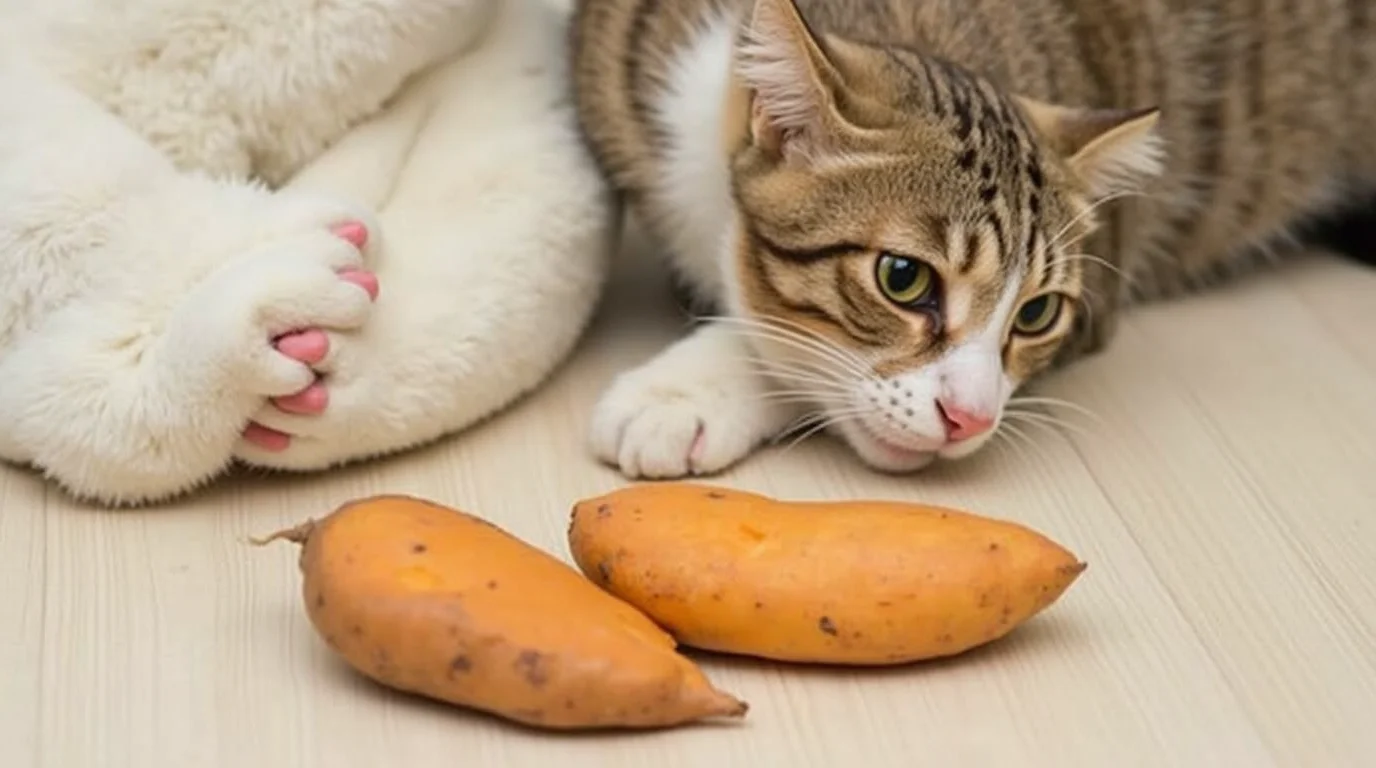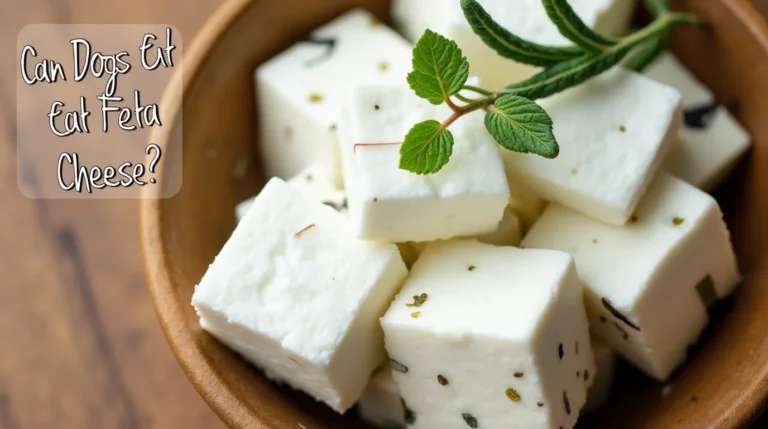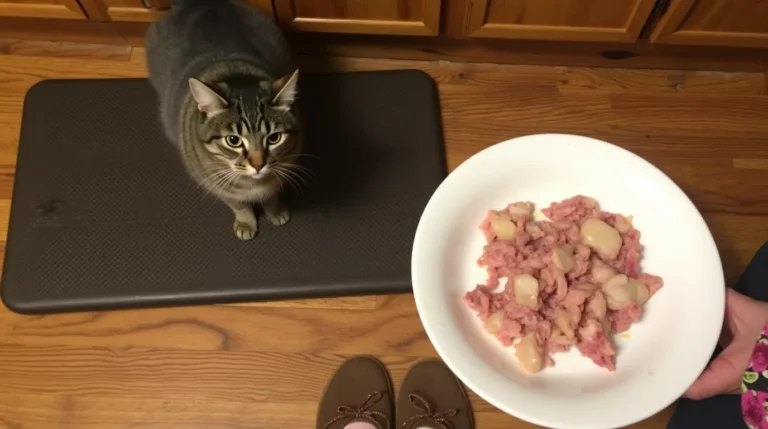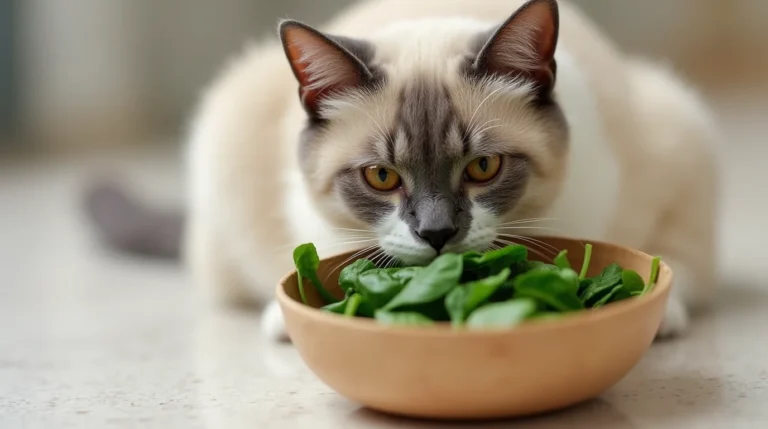Table of Contents
As pet owners, we often wonder if certain human foods are safe for our furry companions. One common question is: Can cats eat sweet potato? While sweet potatoes are not toxic to cats, they are not an essential part of a feline diet.
This article explores the benefits, risks, and best ways to serve sweet potatoes to cats while ensuring their safety and well-being.
Can Cats Eat Sweet Potato Safely?
Yes, cats can eat sweet potatoes in small amounts. However, they do not offer any important nutrients that cats need. Cats are obligate carnivores, meaning their diet should primarily consist of animal protein. While sweet potatoes are safe, they are not a necessary addition to a cat’s meal plan.
Nutritional Benefits of Sweet Potato for Cats
Although sweet potatoes do not replace the essential nutrients found in meat, they contain some beneficial elements:
1. Rich in Fiber
Sweet potatoes contain dietary fiber, which can aid digestion and help with mild constipation in cats.
2. Source of Vitamins
They provide vitamins A, C, and B6, which contribute to overall health. However, cats naturally produce vitamin C, so they do not require it from food.
3. Antioxidants for Immune Support
Sweet potatoes contain beta-carotene, an antioxidant that supports immune function and cell health.
4. Low in Fat
For overweight cats, sweet potatoes might seem like a healthy treat. However, their high carbohydrate content can still contribute to weight gain if given too often.
Potential Risks of Feeding Sweet Potatoes to Cats
While sweet potatoes are not toxic, there are some risks involved in feeding them to cats:
1. Digestive Issues
Cats are not designed to digest large amounts of carbohydrates. Eating too much sweet potato may cause:
- Stomach discomfort
- Diarrhea
- Vomiting
2. High Carbohydrate Content
Cats do not need carbohydrates in their diet. A high-carb diet can lead to weight gain, diabetes, and digestive problems.
3. Choking Hazard
Raw sweet potatoes are hard and difficult to chew, which can pose a choking risk. Always cook them before offering them to your cat.
4. No Essential Nutrients for Cats
Sweet potatoes have helpful vitamins. However, they do not give cats the protein and amino acids, like taurine, that they need to stay healthy.
How to Safely Serve Sweet Potato to Cats
To give your cat a small taste of sweet potato, follow these guidelines:
1. Serve in Small Portions
A tiny bite-sized piece (about half a teaspoon) is enough. Too much can cause digestive upset.
2. Cook It First
Raw sweet potatoes are hard and difficult to digest. Always cook them by boiling, steaming, or baking without any seasoning.
3. Avoid Spices and Additives
Do not serve buttered, salted, or seasoned sweet potatoes. Ingredients like garlic, onions, and butter are toxic to cats.
4. Mash or Cut into Small Pieces
For easier digestion, you can mash or finely chop the sweet potato before serving.
5. Monitor for Any Reactions
After feeding sweet potato, observe your cat for any signs of vomiting, diarrhea, or discomfort. If any issues arise, avoid feeding it in the future.
Can Kittens Eat Sweet Potato?
No, kittens should not eat sweet potatoes. Their digestive systems are extremely delicate. They need a diet rich in protein to help them grow and develop quickly.
Can Cats Eat Raw Sweet Potato?
No, cats should never eat raw sweet potatoes. Raw sweet potatoes are hard, difficult to digest, and can cause choking. Always cook them before offering them to your cat.
Can Cats Eat Sweet Potato Every Day?
No, sweet potatoes should only be an occasional treat, not a daily food. Since cats do not require carbohydrates, feeding sweet potatoes too often may lead to health issues.
Healthier Alternatives to Sweet Potato for Cats
If you’re looking for cat-friendly treats, consider these alternatives:
- Cooked Chicken – A protein-rich, safe snack for cats.
- Pumpkin – A good fiber source that helps digestion.
- Carrots – Cooked, soft carrots are safe in small amounts.
- Blueberries – Some cats enjoy these as an occasional treat.
Vegetables Cats Should Avoid
Not all vegetables are safe for cats. Here are some that should never be fed to felines:
- Onions and Garlic – Highly toxic and can cause anemia.
- Leeks and Chives – Belong to the same family as onions and are equally harmful.
- Mushrooms – Some mushrooms contain toxins that can harm cats.
- Tomatoes – Unripe tomatoes and tomato plants are toxic to cats.
Frequently Asked Questions
1. Can cats eat sweet potato fries?
No, sweet potato fries contain salt, oil, and seasonings, which are unhealthy for cats.
2. Can cats eat canned sweet potatoes?
No, canned sweet potatoes often contain preservatives, sugar, and spices, making them unsafe for cats.
3. Can sweet potatoes help cats with constipation?
In small amounts, sweet potato may aid digestion because of its fiber content. However, too much can cause diarrhea.
4. Can sweet potato be used as a natural remedy for sick cats?
No, sweet potatoes do not contain any essential nutrients for cats. If your cat is sick, consult a veterinarian for proper treatment.
5. What should I do if my cat eats too much sweet potato?
Monitor for symptoms like vomiting, diarrhea, or lethargy. If symptoms persist, contact your veterinarian.
6. Do cats even like sweet potatoes?
Most cats do not naturally show attraction to sweet potatoes. However, some may show curiosity because of the texture or smell.
Conclusion
So, can cats eat sweet potato? Yes, but only in small, occasional amounts. While sweet potatoes are not toxic, they do not provide the essential nutrients that cats need. A meat-based diet is always the best choice for feline health.
If your cat enjoys sweet potatoes, ensure they are plain, cooked, and given in tiny portions. And as always, consult your veterinarian before introducing any new food to your pet’s diet.







